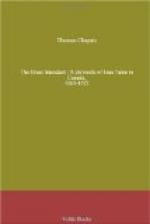unfortunate policy. Thereupon Laval crossed the
ocean to France, obtained the governor’s recall,
and succeeded, though with some difficulty, in maintaining
the former prohibition. In 1663 the Sovereign
Council enacted an ordinance strictly forbidding the
selling or giving of brandy to Indians directly or
indirectly, for any reason or pretence whatsoever.
The penalty for the offence was a fine of three hundred
livres, payable one-third to the informers, one-third
to the Hotel-Dieu, and one-third to the public treasury.
And for a second offence the punishment was whipping
or banishment. In 1667, after the Sovereign Council
had been finally reorganized, the prohibition was
renewed, on a motion of attorney-general Bourdon,
under the same penalties as before, and it devolved
many times upon the council to condemn transgressors
of this ordinance to fines, imprisonment, or corporal
punishment. Talon was present and concurred in
these condemnations. But gradually his mind changed.
He was becoming daily more impressed with the material
benefits of the brandy traffic and less convinced
of its moral danger. He was besides displeased
with the bishop’s excommunication. In his
view it was an encroachment of the spiritual upon
the civil power. Under the influence of these
feelings he came to consider prohibition of the liquor
traffic as a mistake, damaging to the trade and progress
of the colony and to French influence over the Indian
tribes. These were the arguments put forward
by the supporters of the traffic. According to
them, to refuse brandy to the Indians was to let the
English monopolize the profitable fur trade, and therefore
to check the development of New France. The fur
trade provided an abundance of beaver skins, which
formed a most convenient medium of exchange.
The possession of these gave an impetus to trade,
and brought to Canada a number of merchants and others
who were consumers of natural products and money spenders.
Moreover, in Canada furs were the main article of
exportation. Their abundance swelled the public
revenue and increased the number of ships employed
in the Canadian trade. And last, to use an argument
of a higher order, the brandy traffic, in fostering
trade with the Indian tribes, kept them in the bonds
of an alliance and strengthened the political situation
of France in North America.
The above fairly, we think, represents the substance of the plea made by the supporters of the liquor traffic. Such indeed were the arguments used by the traders, finally accepted by Talon, developed in after years by Frontenac, approved by Colbert on many occasions; such was the political and commercial wisdom of those who thought mainly of the material progress of New France. To those arguments Laval, the clergy, and many enlightened persons interested in the public welfare had a double answer. First, there was at stake a question of principle important enough to be the sole ground of a decision. Was it right, for the sake of a material benefit, to outrage natural




